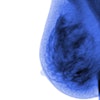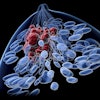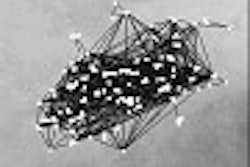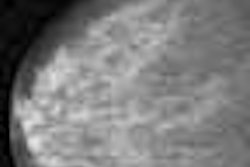HAMBURG, GERMANY - Women in industrialized countries are having fewer children at later ages, and their breasts show it. The loss in breast density that typically occurs after menopause is not occurring as markedly in prior generations, and as a result, their mammograms may miss some tumors, according to a presentation this week at the European Breast Cancer Conference.
Dr. André L. M. Verbeek, a professor in clinical epidemiology at the Central Medical University of St. Radboud of Nijmegen in Nijmegen, the Netherlands, conducted the study. The findings were presented by his co-investigator, radiologist Dr. Frederick van der Horst of the National Training and Reference Center in Nijmegen, which conducts radiologist training and quality control in mammography.
The investigators analyzed a random sample of 2,000 screening mammograms from participants in a regional screening program in the Netherlands. Breasts were categorized as dense if more than 25% of the tissue was dense, and were categorized as lucent if dense tissue constituted less than 25% of the breast.
Surprisingly, 25% of the women 50-69 years old had a dense mammographical breast pattern. Among women 50-54 years old, 44% had dense patterns; among those 65-69 years old, that rate was 17%. The dense patterns could not be solely attributed to the women’s use of hormone replacement therapy (HRT), van der Horst said.
"The actual HRT use was less than 10% in perimenopausal women and almost nonexistent in the elderly," he said.
The investigators viewed the ratio of screen-detected cancers to the total number of screen-detected plus interval cancers as a proxy for mammographic sensitivity. In the dense-breast group, the sensitivity was 59%. In those with lucent breasts, the sensitivity rate was 67%.
"Radiologists know that density plays a role in screening, so these findings could be viewed as confirmatory," van der Horst said. "However, the findings do not detract from the value of mammography screening. It’s the only form of breast cancer screening with proven effect." Although ultrasound is often used as a follow-up modality with dense breasts, van der Horst discouraged routine sonography in such patients.
Two experts commented in separate interviews that continued dense breast tissue after menopause is a trend. "The breast tissue stays denser longer in people today than in previous times, even as short a time as 20 years ago," said Dr. Caroline Blane, professor and associate chair for clinical services in the department of radiology at the University of Michigan in Ann Arbor, MI. "Mammography becomes more difficult because doctors will be trying not to miss anything hiding behind (or) within the dense tissue. Patients will more often need a second diagnostic mammogram to do special views such as spot compression to better analyze the mammogram, so the recall rate from screening for a diagnostic study will increase." Blane conducted an investigation using mammograms from a Swedish database, with similar findings (Academic Radiology, August 2002, Vol. 9:8, pp. 895-898).
"There’s no disagreement that denser breasts are harder to image with mammograms," added Dr. Lawrence Wagman, who chairs the surgery division at City of Hope Cancer Center in Duarte, CA. "The findings show that it’s important for practicing physicians to continue to use all the information available to them, including the physical examination findings and patient’s individual risk."
Wagman agreed that the findings do not detract from mammography’s value in screening. "The density study tells us that the pattern of density is changing," he said. "Therefore, physicians need to keep that in mind when making decisions. The most dangerous course of action would be not to pursue a finding because the imaging study is negative."
By Paula MoyerAuntMinnie.com contributing writer
March 17, 2004
Related Reading
New scanner may find cancer earlier than mammogram, December 5, 2003
Women with genetic history of breast cancer benefit from MR screening, November 30, 2003
Breast ultrasound experts share pearls and pitfalls, October 2, 2003
Hormone replacement therapy complicates breast imaging, June 11, 2001
Copyright © 2004 AuntMinnie.com



















